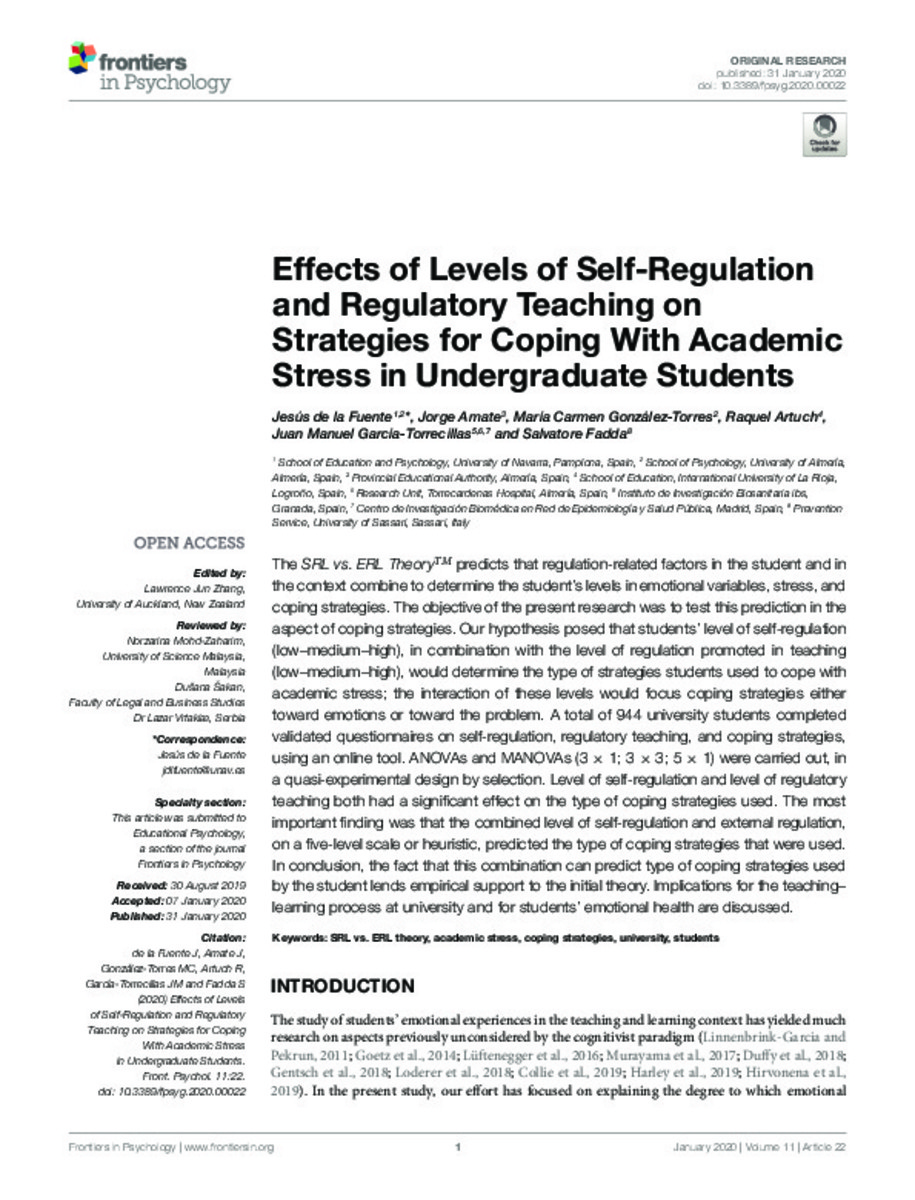Full metadata record
| DC Field | Value | Language |
|---|---|---|
| dc.creator | Fuente-Arias, J. (Jesús) de la | - |
| dc.creator | Amate-Romera, J. (Jorge) | - |
| dc.creator | González-Torres, M.C. (María Carmen) | - |
| dc.creator | Raquel | - |
| dc.creator | García-Torrecillas, J.M. (Juan Manuel) | - |
| dc.creator | Fadda, S. (Salvatore) | - |
| dc.date.accessioned | 2020-02-03T07:47:26Z | - |
| dc.date.available | 2020-02-03T07:47:26Z | - |
| dc.date.issued | 2020 | - |
| dc.identifier.citation | De la Fuente J, Amate J, González-Torres MC; et al. "Effects of levels of self-regulation and regulatory teaching on strategies for coping with academic stress in undergraduate students". Frontiers in psychology. 11 (22), 2020, 1 - 16 | es |
| dc.identifier.issn | 1664-1078 | - |
| dc.identifier.uri | https://hdl.handle.net/10171/58728 | - |
| dc.description.abstract | The SRL vs. ERL TheoryTM predicts that regulation-related factors in the student and in the context combine to determine the student's levels in emotional variables, stress, and coping strategies. The objective of the present research was to test this prediction in the aspect of coping strategies. Our hypothesis posed that students' level of self-regulation (low-medium-high), in combination with the level of regulation promoted in teaching (low-medium-high), would determine the type of strategies students used to cope with academic stress; the interaction of these levels would focus coping strategies either toward emotions or toward the problem. A total of 944 university students completed validated questionnaires on self-regulation, regulatory teaching, and coping strategies, using an online tool. ANOVAs and MANOVAs (3 1; 3 3; 5 1) were carried out, in a quasi-experimental design by selection. Level of self-regulation and level of regulatory teaching both had a significant effect on the type of coping strategies used. The most important finding was that the combined level of self-regulation and external regulation, on a five-level scale or heuristic, predicted the type of coping strategies that were used. In conclusion, the fact that this combination can predict type of coping strategies used by the student lends empirical support to the initial theory. Implications for the teaching- learning process at university and for students' emotional health are discussed. | - |
| dc.description.sponsorship | This work was supported by R&D Project PGC2018-094672- B-I00 (Ministry of Science and Education, Spain), UAL18 SEJ-DO31-A-FEDER (University of Almería, Spain), and the European Social Fund. | - |
| dc.language.iso | en | - |
| dc.rights | info:eu-repo/semantics/openAccess | - |
| dc.subject | SRL vs. ERL theory | - |
| dc.subject | Academic stress | - |
| dc.subject | Coping strategies | - |
| dc.subject | University, students | - |
| dc.title | Effects of levels of self-regulation and regulatory teaching on strategies for coping with academic stress in undergraduate students | - |
| dc.type | info:eu-repo/semantics/article | - |
| dc.relation.publisherversion | https://www.frontiersin.org/articles/10.3389/fpsyg.2020.00022/full | - |
| dc.description.note | This is an open-access article distributed under the terms of the Creative Commons Attribution License (CC BY) | - |
| dc.identifier.doi | doi: 10.3389/fpsyg.2020.00022 | - |
| dadun.citation.endingPage | 16 | - |
| dadun.citation.number | 22 | - |
| dadun.citation.publicationName | Frontiers in psychology | - |
| dadun.citation.startingPage | 1 | - |
| dadun.citation.volume | 11 | - |
Files in This Item:
Statistics and impact
Items in Dadun are protected by copyright, with all rights reserved, unless otherwise indicated.






